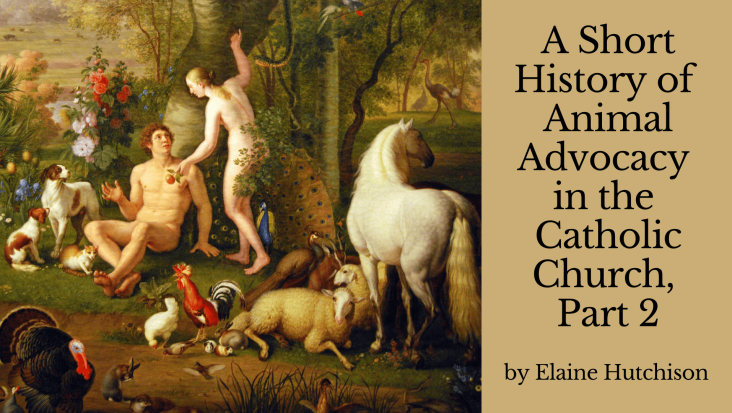posted December 19, 2022
Continued from A Short History of Animal Advocacy in the Catholic Church, Part 1
The Official Church View in Modern Times
It should be noted that all the actions on behalf of animals by those who were commemorated in the Catholic church were committed by individuals—not a bishopric, not an archdiocese, not even a monastery or a nunnery. Although others might have emulated the actions of these early animal activists, there has never been a group of Catholics who featured animal advocacy as part of their religious practice.
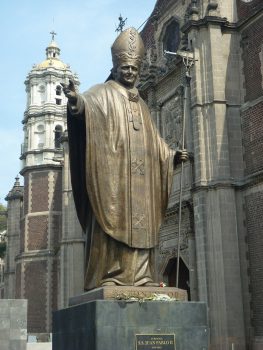
Throughout the centuries following St. Francis, various popes would specifically deny the truths that he held so dear. Several would hold with the Descartes’s philosophy of animals as “meat machines” and Catholic doctrine would caution multiple times against establishing moral duties towards animals, a principle which continues to this day.
For example, the 1948 edition of The Catholic Encyclopedia cautioned, “Societies for the protection of animals may be approved insofar as their objective is to the elimination of cruelty to beasts. Not, however, insofar as they base their activities, as they sometimes do, on false principles (attributing rights to animals…or alleging a duty of charity, which in the Christian sense of that phrase, cannot obtain).”
Animals would fare no better in the 1965 Second Vatican Council which stated the human person is “the only creature on earth that God has willed for its own sake” and the subsequent 1994 Catechism of the Catholic Church which said that animals are “by nature destined for the common good of past, present, and future humanity.”
But even with the stern admonitions of the Church, a few recent popes made some extraordinary statements on the topics of animals having souls and going to heaven.
Pope Paul VI, whose papacy ended in 1978, reportedly comforted a young boy whose dog had died by saying, “One day we will see our animals in the eternity of Christ.”
In 1990 during a private audience, Pope John Paul II said that animals do have souls and are “as near to God as men are.” The Vatican did not publicize this, possibly because it was in direct opposition to Pope Pius IX. During his 19th century papacy, Pope Pius IX was the first pope to declare that animals had no souls or consciousness, and the first pope to establish the doctrine of papal infallibility.
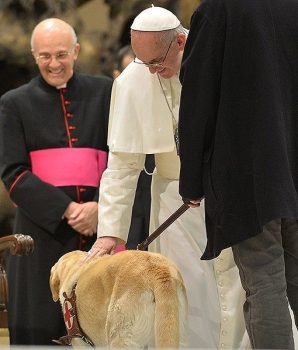
In 2014, animal lovers applauded Pope Francis when he was quoted as saying that animals go to heaven. However, soon after this story appeared worldwide in all forms of media, it proved to be false. An Italian newspaper misquoted him and the translation into English distorted the story even more, resulting in an apocryphal quote that is still getting press today.
But only a year later, the hearts of both Catholic and non-Catholic animal advocates leapt with hope after the release of Pope Francis’s second encyclical, the Laudato Si’ on May 24, 2015. In addition to his commentary on taking care of the Earth, Pope Francis mentioned animals repeatedly, saying “…our indifference or cruelty towards fellow creatures of this world sooner or later affects the treatment we mete out to other human beings. We have only one heart, and the same wretchedness which leads us to mistreat an animal will not be long in showing itself in our relationships with other people. Every act of cruelty towards any creature is ‘contrary to human dignity.’” Elsewhere in the document he said, “Because all creatures are connected, each must be cherished with love and respect.”
The Laudato Si’ also includes a stunning bit of text that seem to contradict the Vatican’s denial of Pope Francis’s do-animals-go-to-heaven comment. In paragraph 243, he writes, “Eternal life will be a shared experience of awe, in which each creature, resplendently transfigured, will take its rightful place and have something to give those poor men and women who will have been liberated once and for all.”
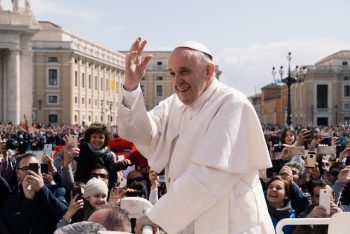
There was another startling reference to animals going to heaven in the comments in paragraph 83. “Here we can add yet another argument for rejecting every tyrannical and irresponsible domination of human beings over other creatures. The ultimate purpose of other creatures is not to be found in us. Rather, all creatures are moving forward with us and through us towards a common point of arrival, which is God, in that transcendent fullness where the risen Christ embraces and illumines all things. Human beings, endowed with intelligence and love, and drawn by the fullness of Christ, are called to lead all creatures back to their Creator.”
To be continued in A Short History of Animal Advocacy in the Catholic Church, Part 3
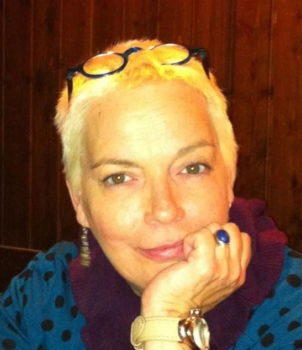
Elaine Hutchison is a ghostwriter, author, Main Street Vegan Academy Master Vegan Lifestyle Coach and Educator, historian, and lover of the old ways. She lives on a small farm in the foothills of the Cascade Mountains where she serves as staff to her beloved animal family. Elaine’s website, Vegan History, dedicated to the history of Veganism, vegetarianism, and animal advocacy, as well as a podcast, will be launched January 31, 2024, Vegan History day.

